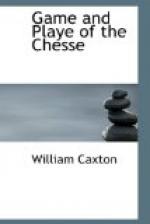with the education of his son, who was afterwards
known to hiftory as Philippe le Bel. It was whilst
occupied with this royal youth that the thought of
composing or compiling—and the terms were
in practice interchangeable in those days—occurred,
and the result was the treatise “De regimine
Principum libri iii.” Philippe le Hardi,
if not an educated man himself—and there
are doubts as to whether he could write his own name—was
laudably anxious that his heir should have the best
instruction that could be obtained. It cannot
well be claimed that the able, handsome, and unscrupulous
Philippe was any great credit to his preceptor.
The despotic and perfidious character of the king probably
owed more to the influence of Nogaret and other defenders
of the “right divine of kings to govern wrong,”
than to the soberer precepts of Colonna. That
Philippe had some tincture of literary feeling may
be inferred from his employment of Jehan de Meung
to translate the military treatise of Vegetius Flavius
Renatus, a compilation of the second century of the
present era, which was so popular in the middle ages
that it was translated by Caxton into English.
Still better evidence is the translation made for
the king by the same poet of Boethius, whose stoical
philosophy must have had a special appropriateness
for those times of political storm and stress, when
the fickleness of fortune must have been a matter
of only too common repute. Guido Colonna was elected
by his admiring brethren the general of the order in
1292, and took up his residence at Bourges, its metropolitan
seat.
In this honourable office he continued his literary
labours, and to this period are assigned the greater
part of his numerous works. He died at Avignon
in 1316. His body was translated to Paris, where
his effigy in black marble, with his epitaph, remained
until the French revolution.[19] It would be superfluous
to enumerate his philosophical writings, for they
would have no interest in the present day. His
commentary on Aristotle “De Anima,” it
may be observed, was dedicated to Edward I. His name
is now chiefly remembered because his work on the
rule of princes formed the basis of the treatise in
which Jacques de Cessoles moralized the fashionable
game of the chess.
One interesting instance of the popularity of Colonna’s
work is the translation of it made into English verse
by Thomas Occleve.[20] He wrote it in 1411 or 1412,
and its object was to obtain the payment of an annuity
from the exchequer which had been granted to him, but
the payment of which was very irregular. The
book was dedicated to the Prince of Wales. After
mentioning his purpose to translate from the (apocryphal)
letter of Aristotle to Alexander and “Gyles of
Regement of Prynces,” he proceeds:—
“There is a booke, Jacob de
Cessoles,
Of the ordre of Prechours,
made, a worthy man,
That the Chesse moralisede
clepede is,
In whiche I purpose eke to
labour ywis
And here and there, as that
my litelle witte
Afforthe may, I thynke translate
it.




